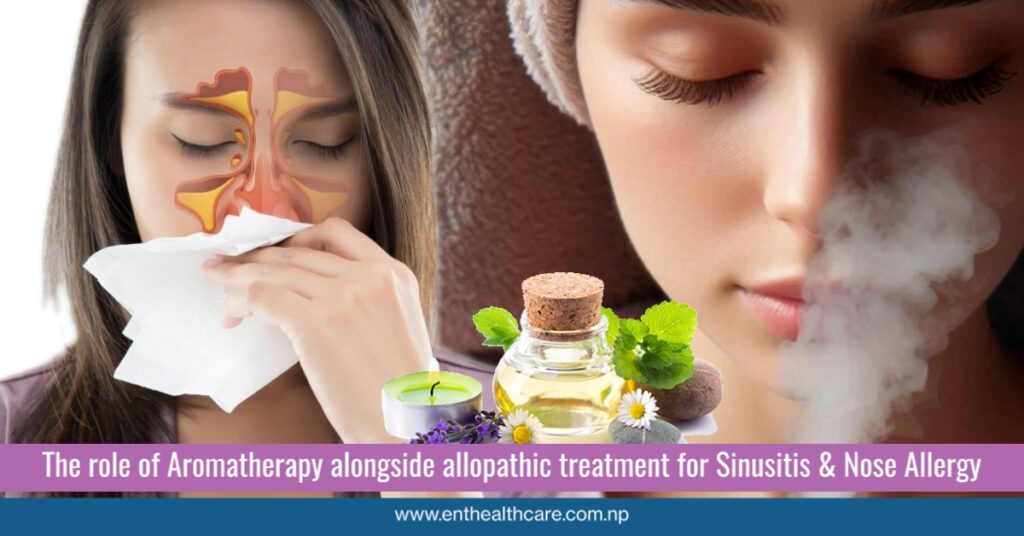
The role of Aromatherapy alongside allopathic treatment for Sinusitis & Nasal Allergy
Sinusitis and nasal allergies are common conditions that can lead to symptoms like nasal congestion, headaches, sneezing, and breathing difficulties. While these two conditions are different, they often share overlapping symptoms and can be triggered by similar factors, such as environmental allergens, infections, and irritants. Allopathic treatments, which include medications like antihistamines, decongestants, and antibiotics, are essential for managing these conditions. However, aromatherapy can serve as a complementary approach to alleviate symptoms and promote overall well-being. In this blog, we will explore how combining aromatherapy with allopathic treatment can provide a more holistic approach to managing sinusitis and nasal allergies.
What Are Sinusitis and Nasal Allergies?
Sinusitis is the inflammation of the sinuses, which can occur due to viral, bacterial, or fungal infections, as well as allergic reactions. Symptoms typically include nasal congestion, facial pain, headaches, reduced sense of smell, and a runny nose.
Nasal allergy, also known as allergic rhinitis, are triggered by exposure to allergens such as pollen, dust, pet dander, or mold. Common symptoms include sneezing, itchy and watery eyes, runny nose, and nasal congestion.
What is Aromatherapy?
Aromatherapy is a holistic healing method that uses essential oils derived from plants. These oils are typically inhaled, applied to the skin, or diffused into the air. The therapeutic properties of essential oils can help reduce stress, boost mood, and improve physical symptoms. By stimulating the olfactory system, essential oils can influence the body’s emotional and physiological responses.
Benefits of Aromatherapy for Sinusitis and Nasal Allergies
When combined with allopathic treatments, aromatherapy can offer several benefits for individuals suffering from sinusitis and nasal allergies:
- Decongestion: Some Essential oils have decongestant properties. Inhaling these oils can help open up the nasal passages, making it easier to breathe.
- Anti-Inflammatory Effects: Some Essential oils can help reduce inflammation in the sinus and nasal passages, which can ease congestion and pain.
- Pain Relief: Some Oils have analgesic effects that can alleviate headaches, sinus pressure, and facial pain associated with sinusitis.
- Reduction of Allergic Reactions: Some essential oils, can reduce the severity of allergic reactions by calming the immune response.
- Stress Relief: Aromatherapy is known for its ability to reduce stress and promote relaxation. Some Oils can help ease anxiety and improve sleep, which is crucial for recovery.
Essential Oils That Help with Sinusitis and Nasal Allergies
Here are examples of some essential oils that can be particularly useful for managing the symptoms of sinusitis and nasal allergies:
- Eucalyptus Oil: Known for its mucolytic and decongestant effects, eucalyptus oil can help open up the nasal passages. It contains a compound called cineole, which helps clear mucus and improve breathing.
- Peppermint Oil: With its menthol content, peppermint oil can help clear the sinuses, reduce headaches, and provide a cooling sensation that eases nasal congestion.
- Tea Tree Oil: This oil contains Terpinene which has antimicrobial and anti-inflammatory properties, making it effective in fighting infections and reducing swelling in the nasal passages.
- Lavender Oil: Lavender which contents Linalool, Linanyl Acetate, Lavandulol etc. is known for its calming and pain-relieving effects. It can help with headaches and sinus pressure, and it also promotes relaxation and better sleep.
- Lemon Oil: Lemon oil contains Limonene which has antiseptic and anti-inflammatory properties that can help relieve allergy symptoms and clear the nasal passages. It is also known to boost the immune system.

What is Essential Oil Blend ?
Blends are a mix of different essential oils aimed at enhancing the synergistic properties of these oils for aromatic and therapeutic use and increase the overall effectiveness of Aromatherapy.
How to Use Aromatherapy with Allopathic Treatment
- Inhalation: Add a few drops of essential oil or blend to hot water and inhale the steam. This can help loosen mucus and clear the nasal passages.
- Diffuser: You can use a diffuser to disperse the essential oils into the air for continuous inhalation.
- Topical Application: Mix a few drops of essential oil with a carrier oil (like coconut or jojoba oil) and gently massage it on the neck, upper chest, or under the nose. This can provide localized relief from congestion and headaches. Note: Essential oils should never be applied directly to the skin without dilution.
- Warm Compress: Add a few drops of essential oil to warm water, soak a cloth in it, and apply it to your face. This method can help relieve sinus pressure and congestion.
Safety Precautions
- Always dilute essential oils before applying them to the skin to avoid irritation.
- Perform a patch test to ensure there are no allergic reactions before using essential oils regularly.
- Pregnant women, children, and individuals with certain health conditions should consult a healthcare provider before using essential oils.
- Aromatherapy should be used as a complementary treatment, not as a replacement for prescribed medications.
Combining Aromatherapy with Allopathic Treatment
Allopathic treatments like antihistamines, decongestants, and anti-inflammatory medications play a crucial role in addressing the underlying causes of sinusitis and nasal allergies. Aromatherapy, on the other hand, can help manage symptoms and improve comfort levels during recovery. Together, these two approaches offer a more comprehensive and personalized treatment plan.
For example, a patient using a prescribed nasal spray for allergies can also diffuse eucalyptus oil to clear the nasal passages or use lavender oil to help with headaches and promote relaxation. By combining these therapies, individuals can address both the cause of their condition and its symptoms, leading to more effective and holistic care.
Conclusion
The combination of aromatherapy and allopathic treatment can provide an effective and balanced approach to managing sinusitis and nasal allergies. While modern medicine targets the root cause of these conditions, essential oils can alleviate symptoms, reduce discomfort, and promote overall well-being. It is important, however, to consult with a healthcare professional before integrating aromatherapy into your treatment plan, especially if you are already taking prescribed medications.
By blending the benefits of modern medicine with the natural healing properties of essential oils, you can create a more comprehensive and personalized approach to treating sinusitis and nasal allergies.
Disclaimer: This blog is written on the basis of reviewing various research articles about Clinical Aromatherapy, Sinusitis and Nose allergies published in the internet.
To learn more about Nose Allergy 👉 Click Here
For inquiries 👉 MESSENGER 👉 INSTAGRAM
For Doctor appointments 👉 Click Here




